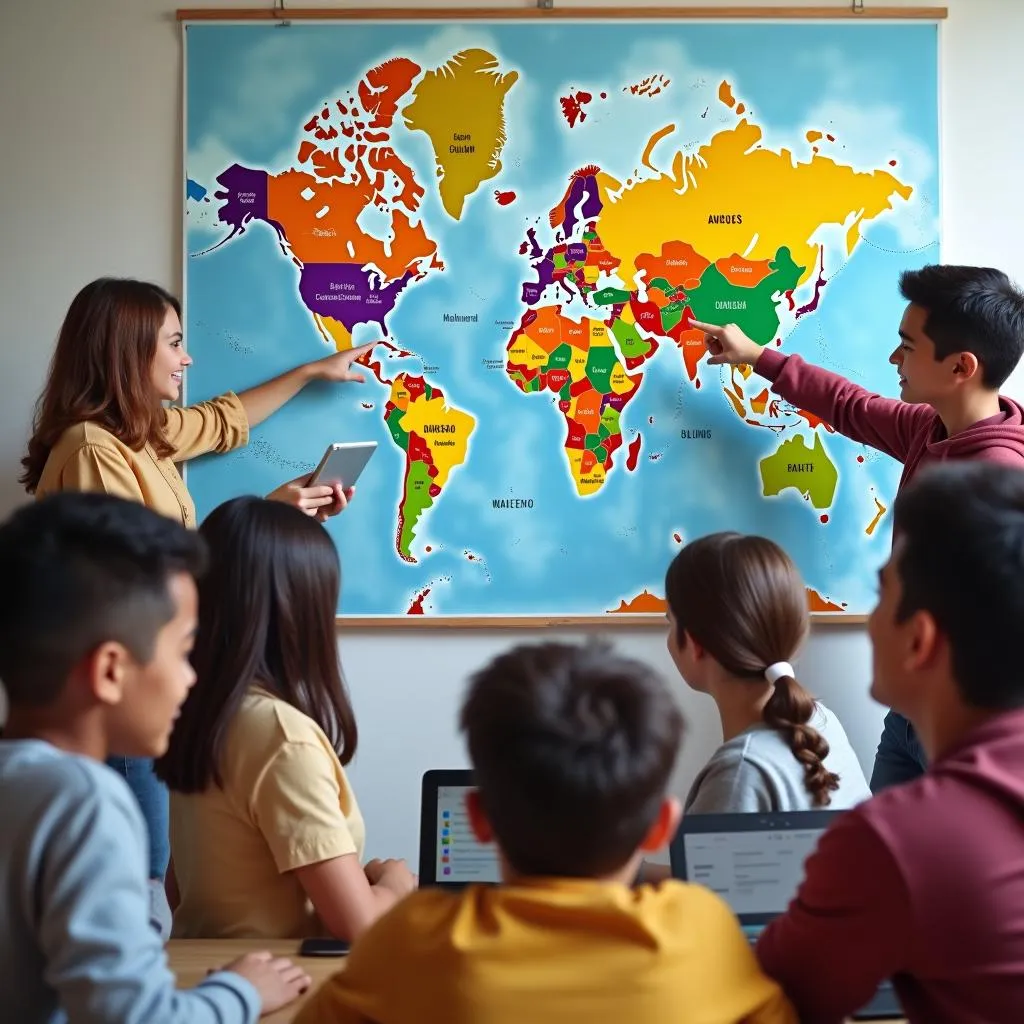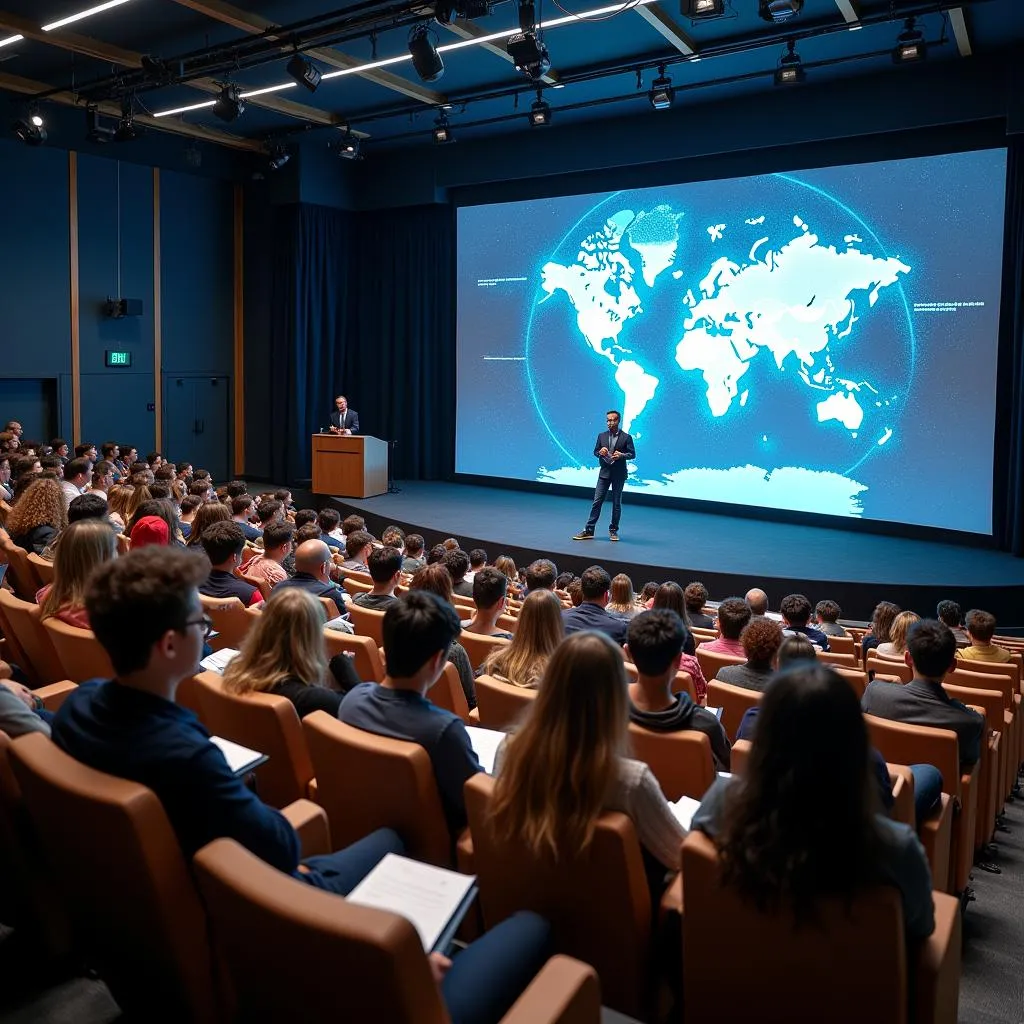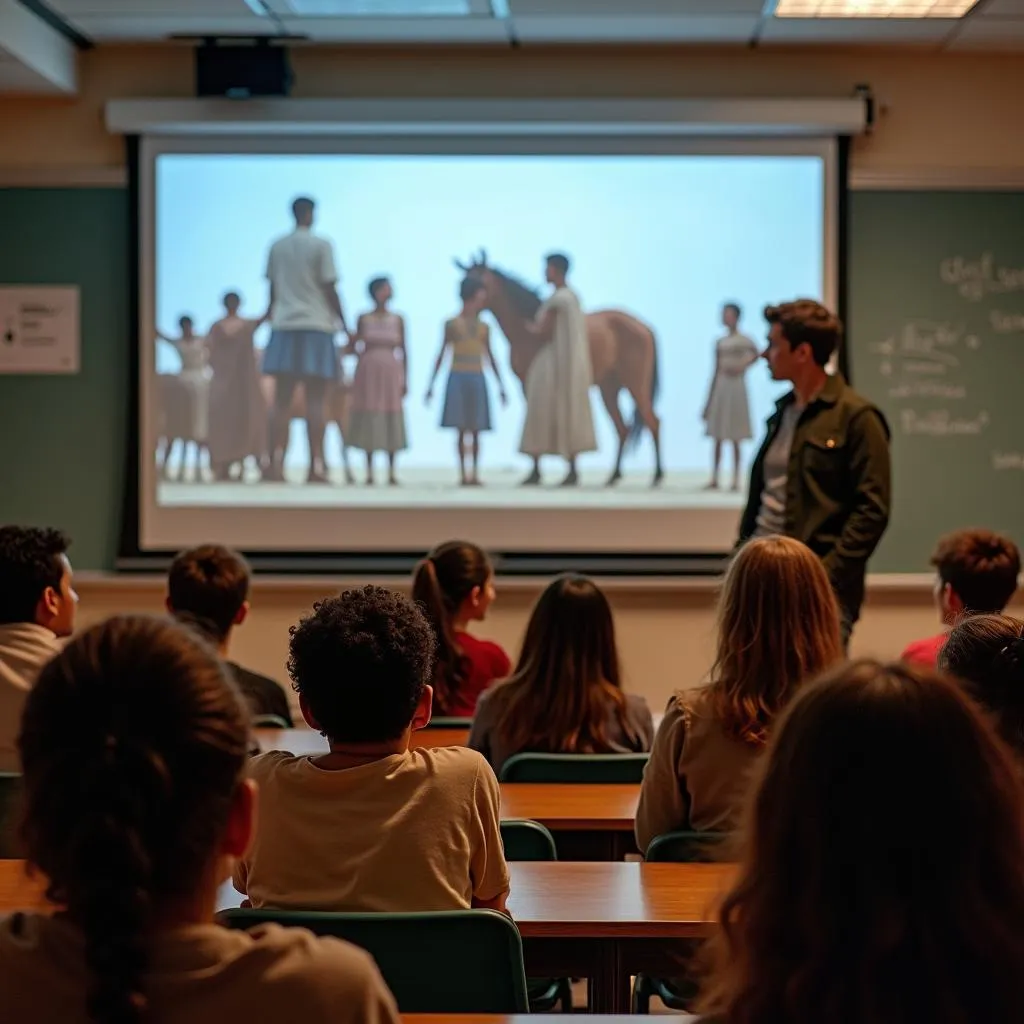Passage 1 – Easy Text
Intercultural education has become increasingly important in our globalized world. It aims to foster understanding and respect between people from different cultural backgrounds, ultimately promoting global citizenship. This approach to education goes beyond simply teaching facts about other cultures; it encourages students to critically examine their own cultural perspectives and develop empathy for others.
Nội dung bài viết
One key aspect of intercultural education is the emphasis on cultural relativism – the idea that cultural practices and beliefs should be understood within their own context rather than judged by the standards of another culture. This helps students develop a more nuanced understanding of global issues and challenges stereotypes and prejudices.
Many schools are now incorporating intercultural elements into their curriculum. This can include language exchange programs, virtual pen pal projects, and studying literature from diverse cultures. These initiatives help students develop cross-cultural communication skills and global awareness, which are crucial for success in an interconnected world.
 Students engaging in intercultural discussion
Students engaging in intercultural discussion
Questions 1-5
Do the following statements agree with the information given in the passage? Write
TRUE if the statement agrees with the information
FALSE if the statement contradicts the information
NOT GIVEN if there is no information on this
- Intercultural education only focuses on teaching facts about other cultures.
- Cultural relativism is an important concept in intercultural education.
- All schools have adopted intercultural education programs.
- Language exchange programs can help develop cross-cultural communication skills.
- Intercultural education is more important for university students than for younger students.
Questions 6-10
Complete the sentences below. Choose NO MORE THAN TWO WORDS from the passage for each answer.
- Intercultural education encourages students to __ their own cultural perspectives.
- The approach aims to develop __ for people from different cultures.
- Cultural practices should be understood within their own __ rather than judged by other standards.
- Intercultural education helps challenge __ and prejudices.
- Virtual pen pal projects can help students develop __ and global awareness.
Passage 2 – Medium Text
The promotion of global citizenship through intercultural education has gained significant traction in recent years. This pedagogical approach seeks to transcend traditional educational boundaries and foster a sense of shared responsibility for global issues. By emphasizing the interconnectedness of cultures and societies, intercultural education equips students with the tools to navigate an increasingly complex world.
One of the primary objectives of intercultural education is to develop cultural intelligence (CQ). This multifaceted concept encompasses the ability to function effectively in diverse cultural settings. It involves not only knowledge of different cultures but also the skills to adapt behavior appropriately and the motivation to engage with cultural differences. Students with high CQ are better prepared to collaborate in multinational teams and address global challenges.
Intercultural education also plays a crucial role in conflict resolution and peacebuilding. By encouraging students to examine issues from multiple cultural perspectives, it helps break down barriers of misunderstanding and promotes dialogue. This approach is particularly valuable in regions with a history of cultural or ethnic tensions, where fostering mutual understanding can contribute to long-term stability.
 Students working on international project
Students working on international project
Moreover, intercultural education supports the development of critical thinking skills. Students learn to question their own assumptions and biases, and to analyze global issues from multiple angles. This critical approach extends beyond cultural matters to encompass broader social, economic, and environmental concerns, thereby nurturing well-rounded global citizens.
The implementation of intercultural education often involves experiential learning techniques. These may include:
- International exchange programs
- Collaborative online projects with students from other countries
- Simulations of global scenarios
- Service-learning initiatives with a global focus
These hands-on experiences allow students to apply their intercultural knowledge in practical settings, reinforcing learning and fostering personal growth.
Questions 11-14
Choose the correct letter, A, B, C, or D.
-
According to the passage, intercultural education aims to:
A) Replace traditional education systems
B) Focus solely on cultural differences
C) Promote a sense of global responsibility
D) Emphasize national identities -
Cultural intelligence (CQ) includes:
A) Only knowledge of different cultures
B) The ability to speak multiple languages fluently
C) Skills to adapt behavior in diverse cultural settings
D) Expertise in international law -
Intercultural education contributes to conflict resolution by:
A) Promoting a single cultural perspective
B) Encouraging examination of issues from multiple viewpoints
C) Avoiding discussion of cultural differences
D) Focusing only on historical conflicts -
Which of the following is NOT mentioned as an experiential learning technique in intercultural education?
A) International exchange programs
B) Online collaborative projects
C) Global scenario simulations
D) Mandatory foreign language courses
Questions 15-20
Complete the summary below. Choose NO MORE THAN TWO WORDS from the passage for each answer.
Intercultural education aims to develop students’ (15) __ intelligence, which helps them function effectively in diverse settings. This approach also supports (16) __ and peacebuilding efforts by promoting dialogue and understanding. It encourages the development of (17) __ skills, enabling students to analyze global issues from various perspectives. The implementation often involves (18) __ techniques, such as international exchanges and (19) __ projects with students from other countries. These experiences allow students to apply their knowledge in (20) __ settings.
Passage 3 – Hard Text
The paradigm of intercultural education as a catalyst for global citizenship has evolved significantly in the 21st century, reflecting the increasingly interconnected and interdependent nature of our world. This educational philosophy transcends the mere acquisition of knowledge about diverse cultures; it aspires to cultivate a profound sense of global consciousness and shared responsibility among learners. The ultimate goal is to nurture individuals who can navigate the complexities of a multicultural world with empathy, critical understanding, and a commitment to addressing global challenges collectively.
At the core of this educational approach lies the concept of cultural fluency, which goes beyond linguistic proficiency to encompass a nuanced understanding of cultural contexts, norms, and values. This fluency enables individuals to engage in meaningful cross-cultural dialogue and collaboration, essential skills in an era where global issues demand transnational solutions. The development of cultural fluency is not a linear process but rather an ongoing journey of self-reflection, experiential learning, and continuous adaptation.
Intercultural education also plays a pivotal role in deconstructing ethnocentrism and fostering a more inclusive worldview. By exposing learners to diverse perspectives and encouraging critical analysis of their own cultural assumptions, this approach challenges the notion of cultural superiority and promotes a more equitable global society. This process of deconstruction and reconstruction of cultural understanding is fundamental in developing global citizens who can contribute positively to intercultural relations and global problem-solving.
 Students attending global citizenship seminar
Students attending global citizenship seminar
The implementation of intercultural education in fostering global citizenship often employs a multifaceted approach, including:
- Comparative cultural studies: Analyzing similarities and differences between cultures to develop a more nuanced understanding of global diversity.
- Critical media literacy: Examining how media representations shape perceptions of different cultures and global issues.
- Experiential learning through virtual exchange: Utilizing technology to facilitate real-time interactions between students from different parts of the world.
- Service-learning with a global focus: Engaging students in projects that address global challenges while fostering intercultural competence.
- Integration of global perspectives across disciplines: Incorporating international and multicultural elements into various subject areas, from literature to sciences.
However, the implementation of intercultural education faces several challenges. One significant obstacle is the potential for superficial engagement with cultural diversity, often termed the “tourist approach,” which may reinforce stereotypes rather than challenge them. Educators must strive to move beyond surface-level cultural exposure to facilitate deep, transformative learning experiences that genuinely expand students’ worldviews.
Another challenge lies in assessing the outcomes of intercultural education. While knowledge acquisition can be measured through traditional methods, evaluating the development of intercultural competence and global citizenship attitudes requires more sophisticated assessment tools. Researchers and educators are continually developing new frameworks and methodologies to capture the nuanced and often intangible aspects of intercultural learning.
In conclusion, intercultural education serves as a powerful vehicle for promoting global citizenship by equipping learners with the knowledge, skills, and attitudes necessary to thrive in a diverse, interconnected world. As global challenges become increasingly complex, the importance of nurturing culturally fluent, empathetic, and critically engaged global citizens cannot be overstated. The ongoing evolution of intercultural education methodologies and their integration into broader educational frameworks will play a crucial role in shaping a more inclusive and sustainable global society.
Questions 21-26
Complete the summary below using words from the box. Write the correct letter, A-L, in boxes 21-26 on your answer sheet.
A) linguistic
B) ethnocentrism
C) superficial
D) multicultural
E) global
F) cultural fluency
G) critical thinking
H) inclusive
I) transformative
J) experiential
K) virtual
L) interdisciplinary
Intercultural education aims to develop (21) __ in learners, enabling them to navigate a complex (22) __ world. This approach helps in deconstructing (23) __ and promotes a more (24) __ worldview. Implementation strategies include comparative cultural studies, (25) __ learning through virtual exchange, and integration of global perspectives across disciplines. However, educators must avoid (26) __ engagement with cultural diversity and strive for deep, transformative learning experiences.
Questions 27-30
Choose FOUR letters, A-G.
Which FOUR of the following are mentioned in the passage as challenges or considerations in implementing intercultural education?
A) Lack of funding for international exchange programs
B) Difficulty in assessing intercultural competence
C) Resistance from students to engage with unfamiliar cultures
D) Risk of reinforcing stereotypes through superficial engagement
E) Shortage of qualified teachers in intercultural education
F) Integrating technology effectively for virtual exchanges
G) Developing sophisticated tools to evaluate learning outcomes
Questions 31-35
Do the following statements agree with the claims of the writer in the passage? Write
YES if the statement agrees with the claims of the writer
NO if the statement contradicts the claims of the writer
NOT GIVEN if it is impossible to say what the writer thinks about this
- Cultural fluency is more important than linguistic proficiency in intercultural education.
- The process of developing cultural understanding is straightforward and linear.
- Critical media literacy helps students understand how media shapes perceptions of cultures.
- Service-learning projects always lead to improved intercultural competence.
- The integration of global perspectives should be limited to humanities subjects.
Questions 36-40
Complete the sentences below. Choose NO MORE THAN TWO WORDS from the passage for each answer.
- The ultimate goal of intercultural education is to nurture individuals with a sense of __ and shared responsibility.
- Cultural fluency enables individuals to engage in meaningful __ and collaboration across cultures.
- Intercultural education challenges the notion of cultural __ and promotes a more equitable global society.
- The “__ approach” to cultural diversity can reinforce stereotypes rather than challenge them.
- The ongoing evolution of intercultural education methodologies will play a crucial role in shaping a more __ global society.
Answer Key
Passage 1
- FALSE
- TRUE
- NOT GIVEN
- TRUE
- NOT GIVEN
- critically examine
- empathy
- context
- stereotypes
- cross-cultural communication skills
Passage 2
- C
- C
- B
- D
- cultural
- conflict resolution
- critical thinking
- experiential learning
- collaborative online
- practical
Passage 3
- F
- D
- B
- H
- J
- C
- B, D, F, G
- YES
- NO
- YES
- NOT GIVEN
- NO
- global consciousness
- cross-cultural dialogue
- superiority
- tourist
- inclusive
This IELTS Reading practice test provides a comprehensive exploration of how intercultural education promotes global citizenship. It covers various aspects of the topic, from basic concepts to more complex implementations and challenges. The passages progress in difficulty, mirroring the structure of an actual IELTS Reading test, and include a range of question types to help test-takers prepare effectively.
For more resources on cultural education and global awareness, you might find these articles helpful:
- Cultural Sensitivity in Teaching Global History
- How Online Platforms Foster Intercultural Dialogue Among Students
- Cultural Diversity in the Teaching of History and Geography
Remember, consistent practice with diverse topics and question types is key to improving your IELTS Reading skills. Good luck with your studies!


